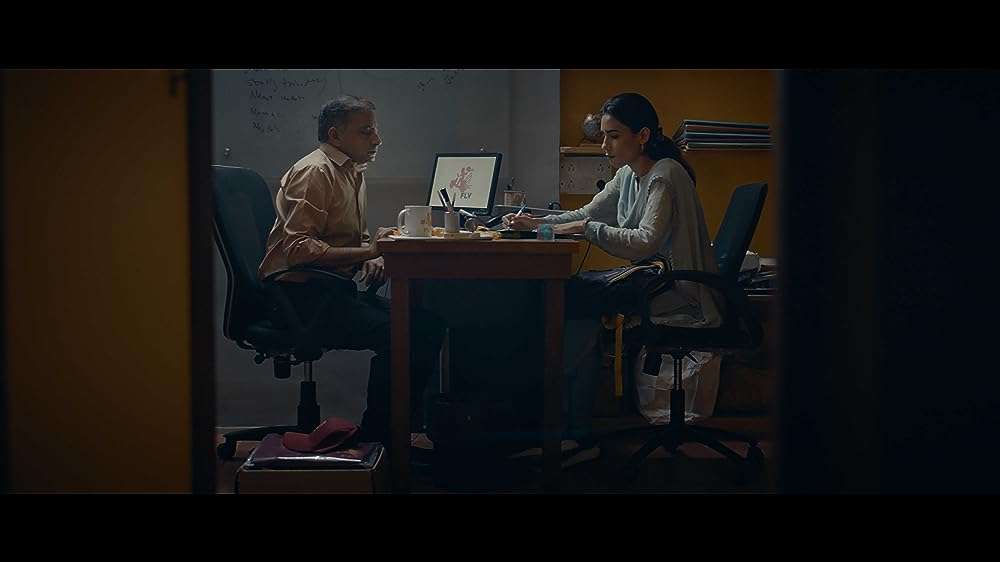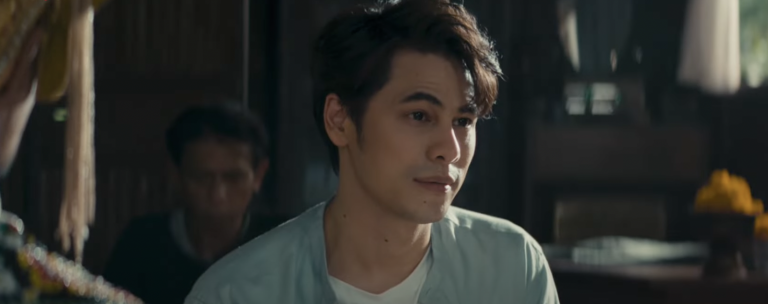Faith is a soulful circumference of religion in the chapter of humanity, whereby a shove of wish or prayer can evoke strength and purpose to deliver concealed resolutions to the sufferings of humankind. Folklore and traditions have produced a plethora of beliefs where science will never be able to enlighten the precise approach of construction that lies between humankind’s affiliation with his inner soul at best. Bearing in mind that religion is an enigmatic missile that can save the world or abolish it in the blink of an eye, director Aman Sachdeva in ‘Opium’ introduces five exhilarating tales in an arrangement of a compilation to push us from the cliffs of familiarity.
Doors are closed and sealed tightly with all the apparatuses available in the house, in the section entitled “The Riot.” Family members fear the enemy monsters that are founding a pact from the outside to turn the households into a massacre, only to grasp that two female individuals (mother and daughter) from the hateful community enter their home to seek sanctuary. Upon meeting, a warped aura forms between these two communities, expressly from the judgments of an adult man and his son. The adult man, who seems to be the spearhead of the family, is not content with the scarred invitation and begins to browbeat the younger female individual with anguish and physical abuse.
Director Aman Sachdeva displays the negative wokeness among certain men to seek vengeance on women in the name of religion in order to promote ferocity as a form of judgment for the affected ones in the entire community. Extreme piousness has prevented the grown man from segregating the customs of living a valued life, despite the hushed warning that his wife shows upon his unjust act. The screenplay focuses unswervingly on the means of abuse, and the expansion of lengthening the severity of exploitation answers the incapability of rational decision-making, which opens the curtain of insanity and extremism.
A disturbing take on the murkier side of religion marks its territory here, which also highlights the parallel depth-ness of how a reference element which is a guide to humankind, could be used as a radical move to somersault the concord and congruence of communities to abolish themselves without the intervention of the main perpetrators. What starts as a community in despair and brawls turns the page into a different world of repudiation.
“The Blind,” the second slice of this film, is a post-apocalyptic saga with a touch of futuristic bonding with a hinge of reverse utopia in the column of religion. The book is tied as a mask representing the appearance of this blind breathing individual, who also carries a suitcase along while probing high and low for any living beings around the area. Talking about the zone embodies a territory filled with ruins and unoccupied spaces, foggy and splintered walls to show the passage of time that the previous residents have left aside.
The cinematography by Sylvester Fonseca succeeds in saying a million words through the atmosphere scaled within the camera’s lens, where a new form of living is conquering the nation following the lines of “The Handmaid’s Tale,” the 2017 US Tv Series. A walkie-talkie being the only communicative tool in this Stanley Kubrick-Yorgos Lanthimos-inspired theme gets heated even further when the masked man aims to rule a sculpture artist on the loose.
Magical realism also grows tall with the motive of the scene where a ladder that emerges from the clouds of light goes directly towards the room of the sculpture artist, foreseeing a messenger mode to save the nation. At the same time, the dominant representative seems to be against the functionality of it. A devout cat-and-mouse game, relapsing the good and the bad to come face to face with the actions of humankind in this satire of religion and its way of evangelization.
Covering the technique to master most of the genres accessible, “Wood” twitches to show on the screen with a hint of dark comedy splashed on the surface. A parsimonious son who wants to save up the cost of a soon-to-appear funeral of his father tries to way down the expenditure by pre-planning a religious conversion. The devious substance that clasps the heat is the degree of a son using religion as a method to hold his savings for personal use. Extracting the sins from the teachings of Christianity are held accountable as reference points to reach a verdict upon the conversion, which also dwells more into the acquaintance of rebirth in Hinduism as a savior.

While one can use religion to their advantage, the other uses the principles against it and shoots it into a business device to accommodate the needs of a devil in disguise. Director Aman opens Pandora’s box here to shine on a convincing manipulator who might also be a frog underneath the coconut shell as shallow-minded individuals do not have the right trail to solve a problem, exclusively when it comes to finances and its associates. The depravity of making the viscous cake out of a religious mold does not need many ingredients, but it might poison the rest who consume it unless the frog hops on the shell and perceives the world.
Actress Geetika Vidya Ohlyan who made her appearance in the critically acclaimed film Soni, plays the role of Ashrafa in this tale entitled “Pulav.” Featuring the religious take on food consumption, Ashrafa starts her career as a food delivery rider but falls into mayhem after discovering that her delivery order contains a forbidden meat source that contradicts her faith. The professional integrity of a delivery rider lies mainly in the swift delivery process and the frequency of delivering orders within a stipulated time.
Yet, the unsought moment of electing one’s teaching of religion and the aptitude for work ethics juggle the day of Ashrafa, which illuminates the framework of this segment. The oppression shown on women clings through the remarks given by male riders upon seeing a woman as a rider, which doesn’t trouble Ashrafa as much as the bacon sandwich that has tumbled down her day. A polarized mode of deliverance highlights the component of religious practices, which are divided into perceptions and sensitivity, where the eventual outcome is influenced by the level of tolerance that the individual desires to pass through and the hurdles that blend with professional ethics. A Pulav might just be the riposte here.
Despite the iniquity of misusing religion as a dark spade of damage, it can also be taken in as a shining light of direction. The fifth and final segment, entitled “A Petal,” showcases a Muslim boy named Mohammad who goes around searching for cow dung as a funeral prayer material for his Hindu friend who has just lost his father. The subtlety of the younger generations who are not exposed to the tarnished influence of negative perceptions of religion could open the doors of heaven on earth itself.
There is a magnet of incredulity that lies in the innocence of Mohammad to envisage his blacksmith neighbor as a monster who spits fire and eventually surpasses the fear just to aid his friend, which is appraisable to the highest end. Something vastly delightful in this segment describes the act of purification, which comes unswervingly from the observance of a person and how religion can be taken as a nutrient for the soul if taken at the proper dosage.
Opium is an imperative film that looks at the religious world within the scope of humanity. Religion has been a quantum to deliver an individual’s projection of hatred and love over a long period of time, with the necessity to nurture the exquisiteness that has blossomed in the roots of the origins. More like fishes in an aquarium, the harmony that lies with different types of fishes lets out an ambiance of union and armistice. Despite the short runtime of 75 minutes to showcase five stories all at once, the thought-provoking session is immensely long at its best. Petite yet practical, Opium can offer roses on your altars or let in sharks in the aquarium to wake your spiritual senses.




![Forbearance [2022] Review – A badly acted and exhausting cancer-picture](https://79468c92.delivery.rocketcdn.me/wp-content/uploads/2022/09/Forbearance-Movie-Review-768x322.png)
![The Farewell [2019] Review: A Comforting Cinema with a harsh tang](https://79468c92.delivery.rocketcdn.me/wp-content/uploads/2019/11/The-Farewell-768x432.jpg)